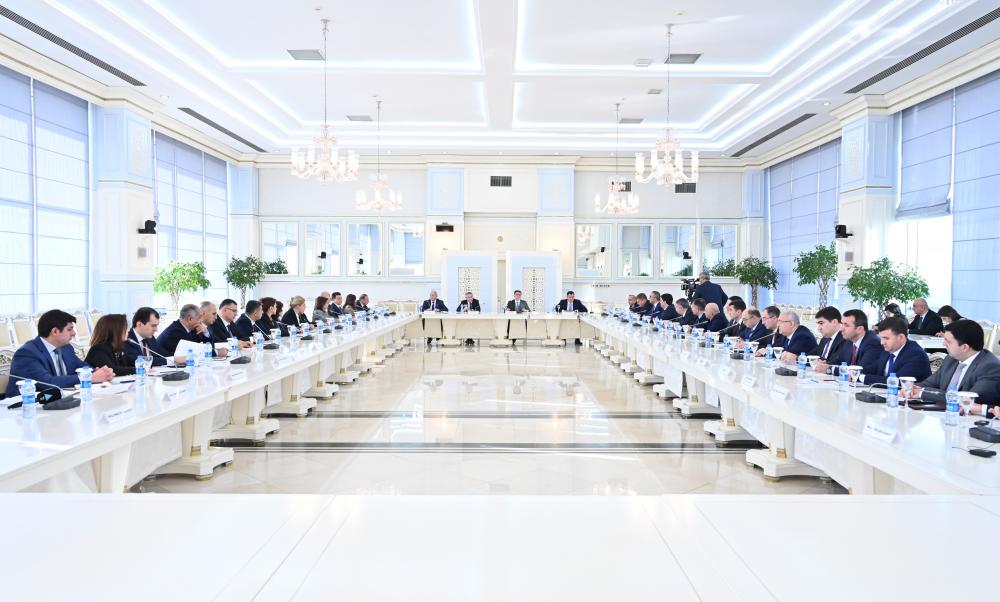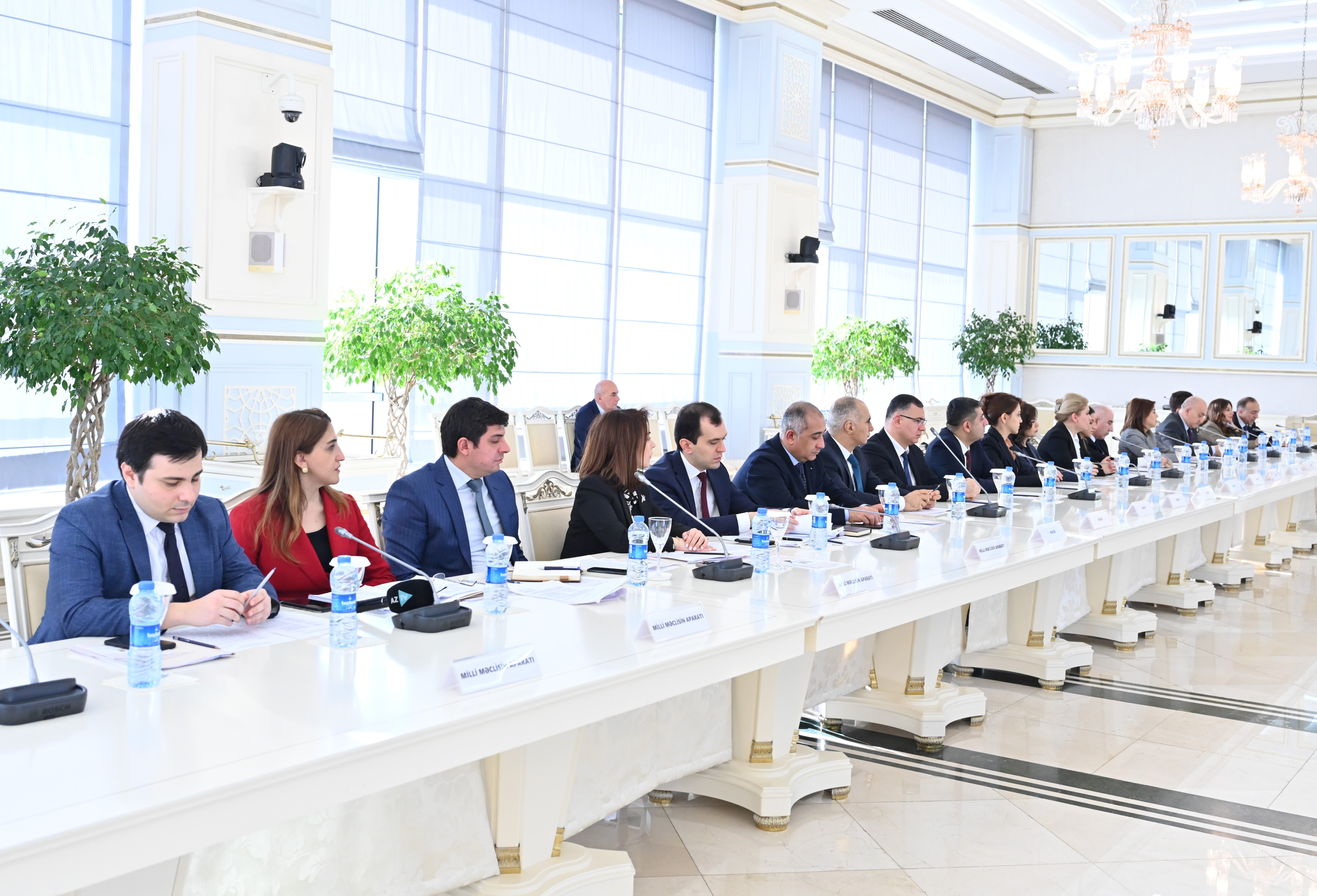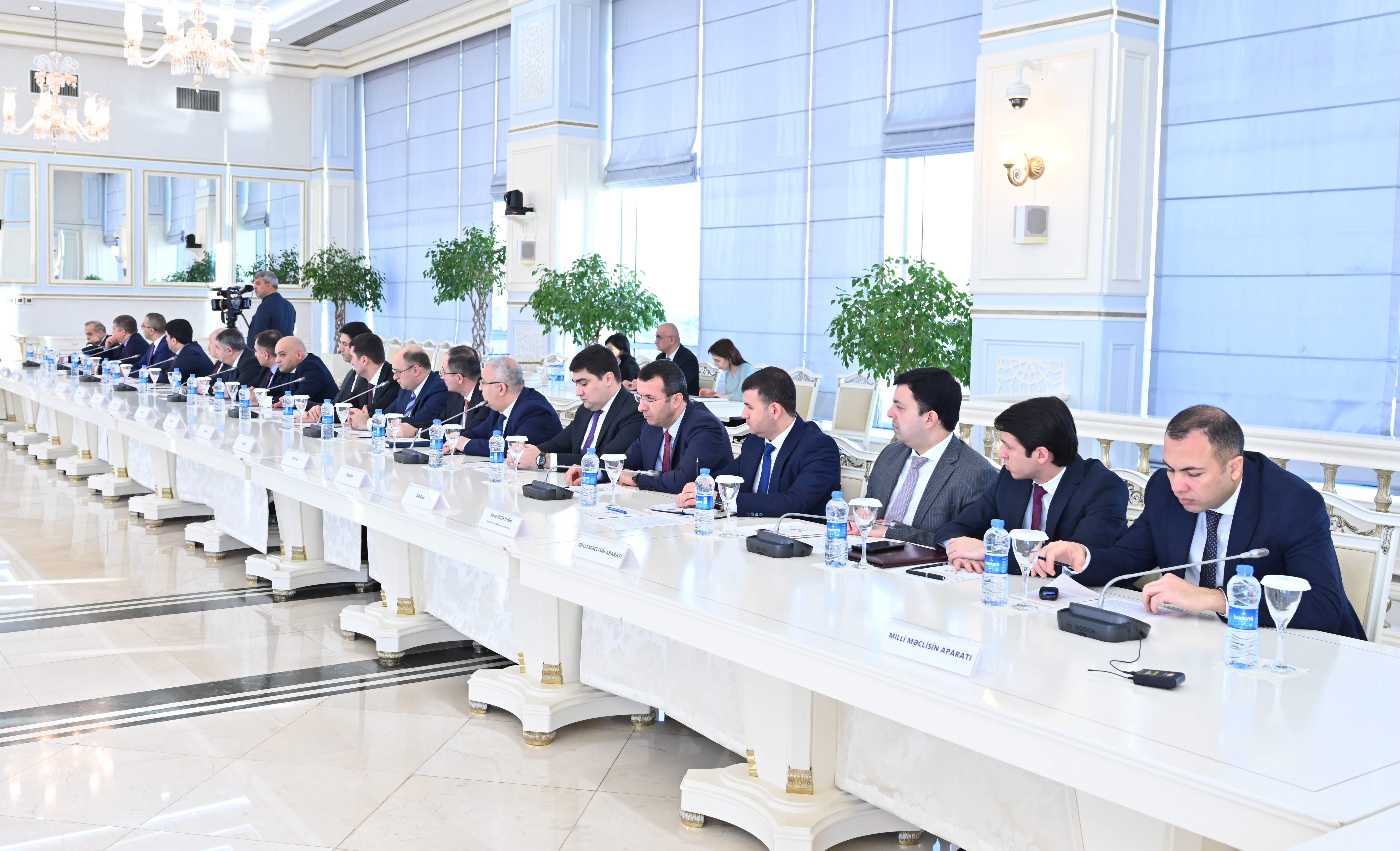Law Policy and State-Building Committee in a Meeting

The Milli Majlis Committee for Law Policy and State-Building held a meeting on 21 December.
Opening it, First Deputy Chair of the Milli Majlis and head of the said committee Ali Huseynli introduced the first seven agenda items, as follows:
- Appointment and dismissal of judges of the Supreme Court of the Republic of Azerbaijan;
- Appointment of judges of the Supreme Court of the Nakhchivan Autonomous Republic of the Republic of Azerbaijan;
- Appointment and dismissal of judges of the Baku Court of Appeal,
- Appointment of judges of the Gandja Court of Appeal,
- Appointment and dismissal of judges of the Sumgait Court of Appeal,
- Appointment and dismissal of judges Шекинского of the Court of Appeal and, lastly,
- Appointment and dismissal of judges of the Shirvan Court of Appeal
Ali Huseynli then gave the floor to Head of the Administration of the Judicial and Legal Council Javid Huseynov so the latter would inform the meeting participants of the above matters.
According to Javid Huseynov, appointing judges is one of the crucial elements of the successful judicial reforms afoot in our country. The number of judges has been increased to 200 permanent positions pursuant to a relevant presidential decree in consideration of the large workload. Judges are being selected intensively to fill the new positions. There have been as many as 83 appointments already whereas 40 judges more are on the eve of being appointed and a further 250 candidates are at various selection stages. Approximately 50% of the newly-appointed judges are women, as Mr Huseynov made a point of saying.
The work of more than 300 judges has been appraised since the approval of the election procedure for judges in March 2021. Approximately 50 judges distinguished in their service have been promoted and 60 others have been appointed to the Supreme Court and the Courts of Appeal pursuant to the pertaining resolutions of the Milli Majlis. Mr Huseynov proceeded to inform the meeting participants in detail of the designation and appointment of judges at the Supreme Court and the Courts of Appeal as well as about their relocation to other positions within the Courts of Appeal and transfers from the latter to first-instance courts of law. All the corresponding nominations submitted for consideration of the committee are based on the findings of a thorough assessment of the judges in question.
Deputy Chairman of the Law Policy and State-Building Committee Gudrat Hasanguliyev, Nizami Safarov, a member of the Judicial and Legal Council and the other MPs: Azay Guliyev, Elshan Musayev, Fazail Agamali, Tahir Karimli, Amina Agazade, Bahrouz Maharramov and Erkin Gadirli proceeded to voice their comments and suggestions.
Javid Huseynov responded to those before it was recommended that the above seven items be brought before a plenum of the Milli Majlis.
Committee Member Nizami Safarov then moved on to agenda items 8, 9 and 10.
He said that the first-reading Bill containing amendments to the Courts and Judges Law were on the unifying side: it was proposed to delete the age limit from the list of requirements that judges must comply with and that is contained in Article 93 of the law. This would be done in keeping with Article 126 of the Constitution.
Furthermore, judges will be appointed for three years to begin with in line with Article 96 (‘Judges’ Post Tenures’) of the Courts and Judges Law. Their performance and results they have achieved will be assessed upon expiry of such three-year terms.
A first-instance court judge may be promoted to higher courts of law depending on results of a given assessment. It is proposed therefore to replace the wording ‘5 years’ with ‘3 years’ in Article 94 of the said law as well as to delete the ‘as a rule’ formulation from Article 64.4 of the Constitutional Law on Regulatory Legal Acts.
Item 9 of the agenda was a set of first-reading amendments to the Charter of the Civil Service Governing Board, the amendments which were technical in nature predominantly and had been drawn up with the intent of optimising the workings of the Board.
The first-reading amendments to the Law ‘On the Rules of Ethical Conduct for Civil Servants’ have to do with the introduction of a position of a commissioner for the implementation of the above-mentioned rules in public bodies. The commissioner would also be responsible for relevant education and for dispute resolution in this area. Besides, the amendments introduce the commissioner’s job description and demark his/her authority scope.
It was head of the Law Policy and State-Building Committee Ali Huseynli who acquainted the meeting participants with the remaining items on the agenda. He told the MPs that Item 11 was about second-reading amendments to the Law ‘On the Institution of the Orders and Medals of the Azerbaijan Republic’ in connexion with the institution of the medal ‘The Centenary of the Supreme Court of Azerbaijan (1923-2023)’. Those amendments would regulate the institution of the new medal. As for Item 12, it dealt with second-reading amendments to the Migration Code, intended to relieve overseas nationals and apatrides of the mandatory requirement to obtain and hold work permits in order to become employed by local IT companies.
Going further, there were third-reading amendments to the Code of Administrative Offences introducing liability for evading the registration of mobile devices.
Item 14 contained third-reading amendments to the same Code of Administrative Offences introducing administrative liability for violation of the rules of assigning, registering and using radiofrequencies and for violation of the rules of defining relevant fees.
The last item on the agenda for the parliamentary committee to peruse for a second-reading Bill with amendments to the Labour, Family and Criminal Codes and the Code of Criminal Procedure as well as to the Laws ‘On the Rights of Child’, ‘On Barristers and the Bar Practice’, ‘On Education’, ‘On the Social Service’, ‘On the State Dactyloscopic and Genomic Registration in the Republic of Azerbaijan’ and ‘On the General Education’. The Bill is drawn up in connexion with the enforcement of the 22 October 2019 law on ratification of the Council of Europe Convention on the Protection of Children against Sexual Exploitation and Sexual Abuse.
The Bills were commented upon by deputy chairman of the committee Gudrat Hasanguliyev and the committee members Erkin Gadirli, Fazail Agamali, Tahir Karimli, Bahrouz Maharramov, Azay Guliyev and Nizami Safarov.
It was recommended ultimately that all the considered Bills should be tabled at a plenum of the Milli Majlis.
The Press and Public Relations Department
The Milli Majlis






